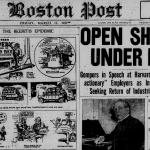Every Day Is Labor Day
https://portside.org/2017-09-10/every-day-labor-day

Portside Date:
Author: Jason Pramas
Date of source:
Dig Boston

For the past many years, I’ve written an annual Labor Day editorial for whatever publication I’m running at the time. And it’s always a relentlessly depressing exercise. Because there just hasn’t been much good news for working people in decades.
Since the 1970s, corporate profits and CEO salaries have skyrocketed nationwide while pay, benefits, and working conditions have stagnated or declined for most everyone else. Unions, once the main institutions of working-class power, have become a shadow of their former selves. Struggling to stop their decline at the hands of both relentless corporate attacks and internal decay. As they diminish, the remaining roadblocks to capitalist supremacy are now being removed. Big business is triumphant and triumphalist. Most news media dutifully trumpets its successes, soft-pedals its failures, and gushes over the most trivial pronouncements of its leaders as if they speak the wisdom of the ages.
I inveigh against this state of affairs on a regular basis, of course. But I didn’t see much point in doing that this Labor Day. Because I wanted to do something more positive than list the manifold crises facing all of us toiling in the Trump era.
Instead, my colleagues and I have decided to use the occasion of the workers’ holiday to announce a new initiative at DigBoston. We will follow in the footsteps of American newspapers of old and start expanding our coverage of both labor union news and workplace issues in general.
Because until about 50 years ago, even at the height of the McCarthy era, mainstream US newspapers covered the travails of working people on a much more regular basis. Some even had a regular “labor page,” or at least a smaller section devoted to “labor notes.” More importantly, working-class organizations and their leaders were consistently considered newsworthy. For example, when Samuel Gompers of the old American Federation of Labor gave a speech at Harvard nearly a century back, it was front-page news. Today, a local appearance by Richard Trumka of the AFL-CIO might get a mention deep within a paper—usually (and ironically) in the business section. Or maybe entirely ignored.
In fact, in most of today’s news media, serious labor coverage from the perspective of working people is limited to one day a year: Labor Day. And the other 364 days a year, labor-related news is reported from the corporate perspective.
If a company lays off hundreds of workers, the news media focuses on the rationale presented by the bosses who ordered the layoff. If workers are injured or killed on the job, it’s first reported as a tragic accident even when it’s clearly the result of management malfeasance.
Much-needed reforms like raising the federal minimum wage to $15 an hour are discussed in terms of how they might hurt corporate profits. Meanwhile, the entire daily news cycle revolves around how the stock market is doing—without ever asking if the global economy should be based on the performance of a giant casino. In this framing, bosses are ever trustworthy and workers are ever suspect. Corporations are largely benign and unions are hopelessly corrupt. Hardly the exemplar of fair and accurate journalism.
We’ve done better than that—with labor-related articles year round—but now we’d like to do better still. By flipping the proverbial script. When covering stories of economic import, DigBoston staff will do our best to ask, “How does this situation help or harm working families and their communities?” When writing editorials on issues that matter to labor, we’ll feature working-class perspectives front and center. We will open our pages wide to opinion pieces by working-class leaders and their organizations, and we will profile ordinary working people on the job. The better to provide our audience a complete picture of the city they live in and improve their ability to make the right decisions about political and economic developments that affect their daily lives. Rather than only reflect a corporate perspective 24/7 like far too many other news outlets.
So that’s where we’re at. We remain independent journalists. We will continue to cover the news critically regardless of subject. But from now on at DigBoston, every day is Labor Day.
Jason Pramas is executive editor and associate publisher of DigBoston.
Jason Pramas is executive editor and associate publisher of DigBoston. He is also network director of the Boston Institute for Nonprofit Journalism and founder of Open Media Boston. For more info, check out: about.me/jpramas/.
